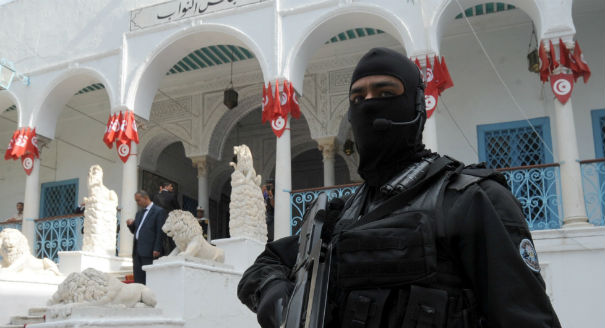Fifteen Tunisian soldiers were killed on July 16 on Mount Chaambi near the Algerian border, the deadliest assault on army personnel in nearly a year. As the soldiers were preparing to break their Ramadan fast, about fifty armed men with grenades, RPGs, and machine guns attacked. Recurrent hostility against the army and security forces—as well as the assassinations of prominent leftist politicians Chokri Belaid and Mohammed Brahmi—all of which are believed to have been carried out by religious extremists, has generated a climate of fear among ordinary Tunisians. This fear is, in turn, increasingly allowing the police and the army to take on a stronger role within state apparatuses. But while Tunisia’s terrorism threat is real, the institutional knee-jerk reaction could risk resurrecting a domineering police state.
Emboldening the police has led to some instances of abuse, which have been rising over the past year. One of the most flagrant examples is the assault by dozens of police officers in April on a regional court in the eastern district of Sousse. The court was in the process of trying an officer who had been convicted of arbitrarily murdering a citizen while on duty. The National Union of the Interior Security Forces, the most prominent police union established after the 2011 uprising, had been demanding his immediate release. Carrying weapons and using state-owned vehicles, members of the union besieged the court for three days and attacked the judges working in it. Without oversight from a weakened ministry of interior, the police unions are taking advantage of the fear of terrorism to act with impunity.
A similar incident occurred in Kairouan in March, when members of the same union broke into and occupied a regional headquarters building of Tunisia’s High Elections Committee two days after Kairouan’s governor denied their request to use the site as a police station. The group of police officers proceeded to replace the committee’s banner with a sign reading “Police.” Such acts of intimidation have been on the rise in Tunisia; there were a total of 101 reported police and army attacks on journalists between April and August 2014 and dozens more examples of police abuses and illegal practices against ordinary citizens as part of the counterterrorism campaign launched last August.
Amid the increasing show of police force—which had been the centerpiece of former president Ben Ali’s police state—the government has adopted policies that could enable the return of old security practices. In a recent executive order last month, Prime Minister Mehdi Jomaa suspended 157 non-governmental religious associations for alleged links to terrorism, mostly small groups engaged in charity and non-violent preaching. The government considered the suspension of their work a necessary preemptive measure against their "likely" support for extremism. Jomaa drew on an outdated 1975 law instead of following the newer, post-revolution Law Number 88 of 2011, which stipulates that only judges have the authority to order the suspension or dissolution of an association. The 2011 law was hailed by human rights groups and in theory took legal precedence over the 1975 law. Jomaa’s use of an outdated law drew sharp criticism from civil society groups and opposition parties.
Moreover, the government closed two radio channels and a number of mosques it deemed to have been promoting extreme religious ideology—also without judicial order or consultation with Tunisia’s newly created independent media authority, the Independent High Authority for Audiovisual Communication. By sidelining this institution and relying on outdated laws, the government made clear its view that security concerns supersede democratic procedures.
Meanwhile, as Tunisia’s technocratic government strives to contain the terror threat, the country’s political actors are battling to gain control of the terrorism narrative. For instance, Rached Ghannouchi, chairman of the Ennahda party, believes that Islamist violence stems from the deep state’s attempts to sabotage the democratic process. The opponents of Ennahda believe the party is responsible for Tunisia’s political assassinations and recent attacks on military personnel because it allegedly gave too much leeway to religious extremists following the 2011 revolution. This line of reasoning is often used to justify the government’s recent crackdowns, along with police impunity, as necessary measures to ensure stability. However, the security forces are receiving uncritical support from the anti-Islamist segments of the political elite. This brings into question the kind of role these elites will play in terms of security sector reform after the coming October elections.
Ultimately, religious extremism and non-state violence are serious problems in Tunisia. But in the long run, countering such threats with authoritarian repression and manipulations of the law could doom Tunisia’s fragile transition. Extreme state oppression has often caused radicalism to flourish rather than die out. The absolutist security state stance of Tunisia’s old elites is more likely to undermine freedoms than improve security, and thus upholding rather than undermining the country’s fragile democratic laws is critical. Tunisians will do well to consider Benjamin Franklin’s famed quote: “Those who would give up essential liberty to purchase a little temporary safety deserve neither liberty nor safety.”
Omar Belhaj Salah is a Berlin-based independent Tunisian researcher.








